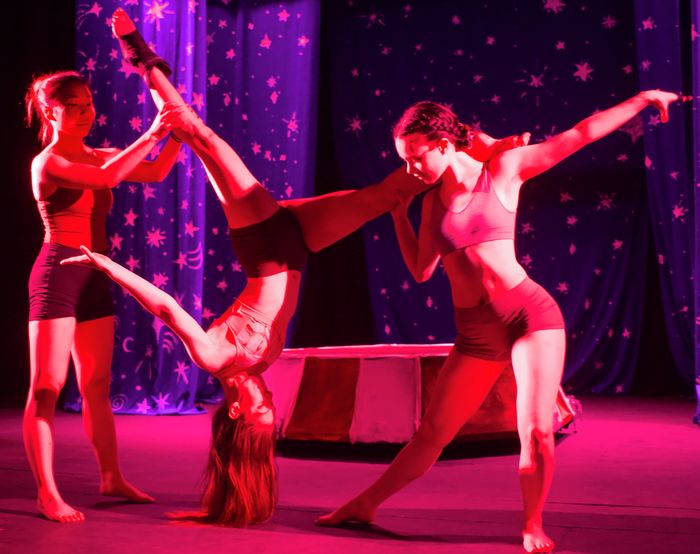(Re)Present monologue night offers fresh perspectives
Writer Charlie Butler reviews a night of monologues inspired by Renaissance plays at the ADC

Last night the ADC played host to a series of nine student-written monologues grouped under the title of ‘(Re)Present’. The brainchild of director Anna Freeman, the intention behind the show was to give a voice to characters from Renaissance plays who, for whatever reason, are silenced in the original works.
The writers made use of a wide range of styles, and it was extremely interesting to see the different directions in which the concept was taken. One of the most original scenes saw Gloriana (Molly Elliot) from The Revenger’s Tragedy beseeching the Dukes of Hell to allow her lover, Vindice, to join her in heaven. A more obvious but by no means less engaging monologue was delivered by Lizzie Banner in the role of Katherine from The Taming of the Shrew, which provided a satisfying yet heart-breaking interpretation of the play’s infamous conclusion.
The opening monologue was delivered by Tayo Adewole in the role of The Porter from Macbeth. Although Adewole’s recurring plea to “remember the porter” was rather effective, overall, I found the intentionally ‘Shakespearey’ use of language a little contrived and personally struggled to understand much of it.
This was in stark contrast to the monologue which followed, in which Rosaline (Tasmin Sarkany) from Romeo and Juliet used a conversational tone, contemporary language, and blank verse in order to discuss her feelings upon hearing the news of Romeo’s death. Although this soon descended into a somewhat woolly series of musings upon the place of women in history, the very first line she delivered has stuck with me. Perhaps because it hammers home the incredible youth of the two main characters and de-romanticises the awful, avoidable tragedy of their death: “I heard the infatuated boy died yesterday”.
One scene which seemed to sit apart from the others in terms of concept featured a recently widowed woman (Maia von Malaisé) expressing joy at the passing of her abusive husband. Her dialogue was wonderful – harrowing, yet lightened by touches of humour, and Malaisé delivered it masterfully. However, you may be wondering which of Shakespeare’s characters was embodied here – a silent queen from a history play, perhaps? Or maybe this is the fate of a character from one of his comedies, thirty years on from the big group wedding at the end of the play. You probably wouldn’t guess that this was supposed to be Feste – the fool from Twelfth Night. Although I understand the idea behind this choice – that the character was forced to ‘play the fool’ in her marriage – throughout the performance I found myself thinking about whether or not I had misheard the introduction.
“The acting was impressive all round”
Arguably, the show was somewhat inaccessible for people unfamiliar with the original Renaissance texts. This was not a problem for scenes which focused on the emotional state of their characters – I had never seen The Winter’s Tale, for instance, and yet Daisy Brown’s performance as the imprisoned Hermione was so captivating and the dialogue so beautiful, that the lack of context did not detract from my enjoyment of the scene. Monologues like the one written for Ariel, (Misha Koshutskyy) which continually referenced events and characters from other points in the play, however, left me with the familiar sensation of being at a seminar I hadn’t done the reading for. I couldn’t help but feel as though I should’ve done some homework before leaving for the theatre.
“High-emotion scenes were interspersed with more understated monologues”
The acting was impressive all round. In addition to Brown’s heart-wrenching turn as Hermione, special recognition must be given to Alexander Tsang, whose wonderfully expressive performance as Caliban was undoubtedly the greatest portrayal of the character that I have ever seen.
High-emotion scenes such as these were thankfully interspersed with more understated and yet often equally impactful monologues, such as the one delivered by Desdemona (Olivia Twiss). This performance made excellent use of the format, acting as a ‘missing soliloquy’ of sorts.
Some Shakespeare snobs will doubtless have left the ADC incandescent with fury last night (or more likely just slightly peeved), having perceived these monologues as arrogant attempts to improve upon the immortal perfection of the Bard. But the writers and performers involved in last night’s show were by no means trying to 'fix' these plays. The evening was a celebration of their infinite potential for reinterpretation.
 News / Caius mourns its tree-mendous loss23 December 2025
News / Caius mourns its tree-mendous loss23 December 2025 News / Clare Hall spent over £500k opposing busway 24 December 2025
News / Clare Hall spent over £500k opposing busway 24 December 2025 Comment / The ‘class’ of Cambridge24 December 2025
Comment / The ‘class’ of Cambridge24 December 2025 Interviews / Politics, your own way: Tilly Middlehurst on speaking out21 December 2025
Interviews / Politics, your own way: Tilly Middlehurst on speaking out21 December 2025 Comment / Yes, I’m brown – but I have more important things to say22 December 2025
Comment / Yes, I’m brown – but I have more important things to say22 December 2025








